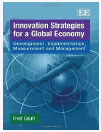Services on Demand
Article
Indicators
Related links
-
 Cited by Google
Cited by Google -
 Similars in Google
Similars in Google
Share
South African Journal of Science
On-line version ISSN 1996-7489
Print version ISSN 0038-2353
S. Afr. j. sci. vol.107 n.1-2 Pretoria Jan./Feb. 2011
http://dx.doi.org/10.4102/sajs.v107i1/2.584
BOOK REVIEWS
A new focus on innovation for development
John MugabeI,II
IGraduate School of Technology Management, University of Pretoria, South Africa
IIScience and Innovation Policy Studies Corporation, Pretoria, South Africa
Book Title: Innovation strategies for a global economy: Development, implementation, measurement and management
Book Cover:

Author: Fred Gault
ISBN: 978-1-55250-484-0 (IDRC e-book)
Publisher: Edward Elgar Publishing Limited and the International Development Research Centre (IDRC); 2010, R715.54*
The concept of innovation is widely used in academic and decision-making circles around the world, yet its precise meaning is rarely carefully defined. In some circles innovation is equated to research; in others, innovation is technology. It is not uncommon to come across national research and development (R&D) policy documents that bear the title of 'national innovation strategies' when in their content there is no reference to or discussion of innovation. Policymakers (and policy documents) of many governments tend to use R&D and innovation interchangeably - mainly because they have not clarified these concepts in simple non-theoretical ways.
In his recently published book, Fred Gault not only defines what innovation is, but also discusses how innovation is measured and the kinds of strategies that should be instituted to promote it. Drawing on his many years of experience in developing indicators for measuring innovation in the Organization for Economic Cooperation and Development (OECD) and in many developing countries, Gault defines innovation as 'the creation of value from knowledge, a driver of economic growth'. The book elucidates key features of innovation: risk, non-linearity and learning. Innovation entails taking risk. It is a non-linear process of learning to introduce a new idea or new ideas into an economic system. Innovation induces change in social and economic systems. However, the benefits and impact of innovation cannot be predetermined. Strategies for promoting innovation must take these factors into consideration.
Innovation strategies for a global economy emphasises the role of institutions and individuals in innovation. It is individuals working in firms and other institutions that 'create value from knowledge'. In a national innovation system, individuals are connected and institutions are also connected. Innovation is rarely the work of a single individual working in a single isolated institution. It is all about dynamic systems. The book emphasises the role of interactions among individuals, and interactions among institutions, both private and public. It discusses the role of government, civil society, businesses, manufacturing companies and other actors in nurturing innovation and building national innovation systems. Coordination of the activities or actions of the different actors is critical. This is a challenge for many countries. Governments around the world are experimenting with different institutional arrangements or models of coordinating innovation activities and strategies. Some countries are using a centralised approach where coordination functions are in the offices of presidents or prime ministers. There are also many countries where a department or ministry of science, technology or trade and industry is responsible for coordination. The book suggests that each country should adopt a coordination approach that is suitable to its governance situation.
Gault brings conceptual clarity to the discussion of innovation; and how to design national innovation strategies. He lays out a framework that policymakers should use to guide the formulation, implementation and evaluation of innovation strategies. Though based mainly on OECD country experiences and practices, the discussion of how innovation strategies are developed is both rich and relevant to developing countries. The book is a valuable contribution to the 'science of innovation policy'. Scholars of innovation and decision-makers in government and private sector will find Gault's book a source of new ideas and practical experience on designing innovation strategies to manage change in a global economy that is under increasing flux as a result of rapid technological advances, increasing threats from climate change and globalisation.
 Postal address:
Postal address:
Postnet Suite 7, Menlo Park 0108
Private Bag X19, South Africa
email: john.mugabe@up.ac.za
* Book price at time of review














